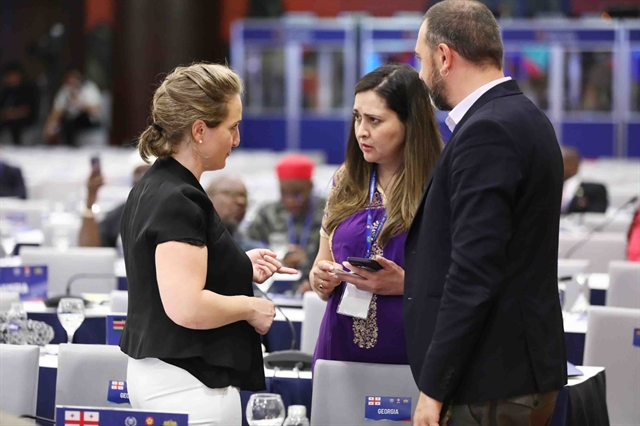 Society
Society

 |
| Delegates exchange ideas at the discussion on innovation and start-ups at the 9th Global Conference of Young Parliamentarians in Hà Nội on Friday. — VNA/VNS Photo |
HÀ NỘI — Learning opportunities and support policies for innovation and start-ups take centre stage as diplomats and entrepreneurs shared best case practices in the field at the 9th Global Conference of Young Parliamentarians on Friday.
Speaking at the panel discussion on innovation and start-ups, Denis Naughten, a member of the Irish Parliament, cited an example of how enterprise programmes are opened to students aged 12 to 18 in Ireland as they face growing career pressure that comes with secondary education.
The activities, during which the whole class turned into a company with marketing, sales, manufacturing and material-sourcing divisions, not only helped build their entrepreneurial spirit and get an insight into how business works but also developed critical teamwork skills, said the Irish official.
A network of over 300 digital hubs has been set up across Ireland, each of them linked to an enterprise development officer who will support innovative ideas and potential start-ups that may be generated from the engagement within the hubs.
“Innovation is essential if they want to stay ahead in a competitive and fast-changing market,” said Naughten, who is also the chairperson of the Inter-Parliamentary Union (IPU) Working Group on Science and Technology.
Nguyễn Thành Trung, founder and CEO of the Vietnamese start-up “unicorn” SkyMavis, stressed the role of policymakers in developing the start-up ecosystem, which in turn is the decisive factor in the existence and sustainability of technology entrepreneurship.
“The government's influence can be a make-or-break factor to start-ups,” said Trung.
Noting that not only Việt Nam but the world at large is struggling to promulgate new technology-related policies, Trung underlines that digital information nowadays is no longer a choice but a necessity and also a commodity.
Whether a clear legal corridor, whether open or strict, will be a great help to start-ups which are now having to spend a significant amount of time on business structure problems and legal issues, said the entrepreneur.
Sharing an example of how China develops its innovation and start-up sector, manager of the Beijing-based HICOOL Global Entrepreneur Summit and Entrepreneurship Competition Tingyu Yuan said that the initiative officially began in 2018 by former Chinese Prime Minister Li Keqiang.
A series of measures under the mass entrepreneurship and innovation policies have been implemented, including simplifying the start-up registration process and reducing the bureaucratic hurdles, and the online one-stop policy which allows entrepreneurs to complete business registration through a single online platform without the need to physically visit different government departments.
“This encourages more people to participate in entrepreneurship and especially creates more possibilities for young graduates to creatively consider their careers and to utilise their knowledge and skills for the best development,” said Yuan.
Alongside tax relief measures, comprehensive banking services and establishment support are also available to start-ups.
These include low-interest rates and loans, inclusive financial policies and instruments, financial literacy and management skills training.
“All the improvements of institutions and policies in the promotion of innovation or start-ups are the basic structures that we can see the need to make the most effort in all the social segments to build and foster a supportive, tolerant and encouraging environment.”
"There is an African saying that 'it takes a village to raise a child', similarly, to nurture a start-up we would need a robust ecosystem," said Biniam Gebrezgi, a specialist on the Civil Society and Youth, Governance and Peace Building Team of the United Nations Development Programme (UNDP). — VNS




